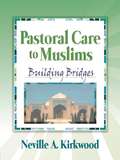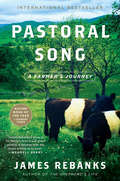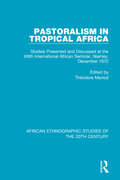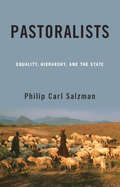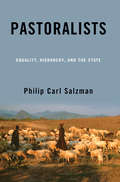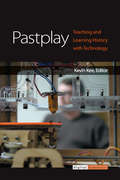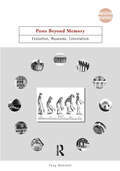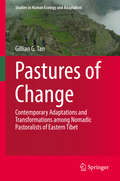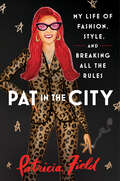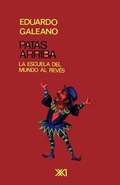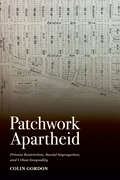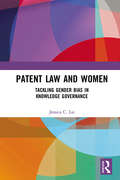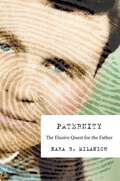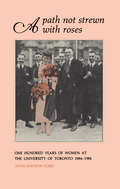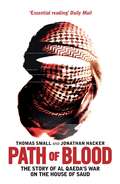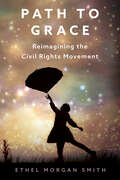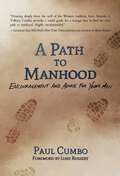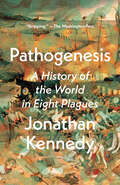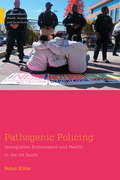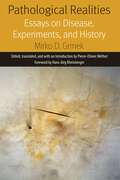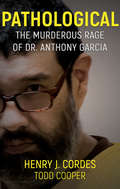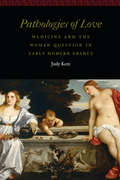- Table View
- List View
Pastoral Care to Muslims: Building Bridges
by Neville A. KirkwoodFulfill Christ's injunction in Matthew 25!Pastoral Care to Muslims: Building Bridges recognizes that more and more often pastoral care workers are encountering Muslims in hospitals. This is the guidebook you need to provide the spiritual support these patients are able to accept--support that doesn't conflict with their religious affiliations.The first section of Pastoral Care to Muslims provides an outline of the major beliefs of Islam, chiefly those that relate to illness and dying. The Koran is freely quoted to support these beliefs and practices. The second section of the book delivers a set of guidelines for the practice of pastoral care to hospitalized Muslims. These guidelines have been field tested with positive results. The book's two appendixes supply you with samples of the kinds of prayers that are acceptable to Muslims. In this valuable book you'll find: background information about the Muslim faith quotations from the Koran that you can use in your practice what you need to understand about the Muslim view of sickness, death, and dying Plus explanations of terms and concepts found in Islam, including: the Islamic Creed Tawhid (the concept of the unity of God) Gehenna (Hell) the Five Pillars of IslamPastoral Care to Muslims: Building Bridges will help you do just that: build bridges between Christians and Muslims. It will supply you with material you can use to minister to Muslims without the fear of offending them and give you the confidence you need to deliver effective pastoral care to this growing segment of the population.
Pastoral Song: A Farmer's Journey
by James RebanksA gorgeous and enduring portrait of the regeneration of a traditional farm in England’s Lake District International Bestseller * Named "Nature Book of the Year" by the Sunday Times * Shortlisted for the the Orwell Prize and the Royal Society of Literature's Ondaatje Prize * A BEST BOOK OF THE YEAR: Sunday Times, Financial Times, New Statesman, Independent, Telegraph, Observer, and Daily Mail"A MASTERPIECE. ... A poetic, practical, raw, and almost miraculously detailed picture of this ancient way of life struggling to survive and to be reborn." ―New StatesmanThe New York Times bestselling author of The Shepherd’s Life chronicles his family’s farm across three generations, revealing through this intimate lens the profound global transformation of agriculture and of the human relationship to the land.As a boy, James Rebanks's grandfather taught him to work the land the old way. Their family farm in the Lake District hills was part of an ancient agricultural landscape: a patchwork of crops and meadows, of pastures grazed with livestock, and hedgerows teeming with wildlife. And yet, by the time James inherited the farm, it was barely recognizable. The men and women had vanished from the fields; the old stone barns had crumbled; the skies had emptied of birds and their wind-blown song.Hailed as "a brilliant, beautiful book" by the Sunday Times (London), Pastoral Song (published in the United Kingdom under the title English Pastoral) is the story of an inheritance: one that affects us all. It tells of how rural landscapes around the world were brought close to collapse, and the age-old rhythms of work, weather, community and wild things were lost. And yet this elegy from the northern fells is also a song of hope: of how, guided by the past, one farmer began to salvage a tiny corner of England that was now his, doing his best to restore the life that had vanished and to leave a legacy for the future.This is a book about what it means to have love and pride in a place, and how, against all the odds, it may still be possible to build a new pastoral: not a utopia, but somewhere decent for us all.[Published in the United Kingdom as English Pastoral.]
Pastoralism in Tropical Africa
by Théodore MonodOriginally published in 1975, the papers collected in this volume review African pastoralism in both West and East Africa, in relation to economy, ecology, social and community organisation, kinship, inter-group relations, modern administrative attitudes and policies and problems of development. The challenges confronting peoples and cultures in Africa which practise pastoralism are discussed.
Pastoralists
by Philip Carl SalzmanDrawing upon the author's extensive field research among pastoral peoples in the Middle East, India, and the Mediterranean, and on more than 30 years of comparative study of pastoralists around the world, Pastoralists is an authoritative synthesis of the varieties of pastoral life. At an ethnographic level, the concise volume provides detailed analyses of divergent types of pastoral societies, including segmentary tribes, tribal chiefdoms, and peasant pastoralists. At the same time, it addresses a set of substantive theoretical issues: ecological and cultural variation, equality and inequality, hierarchy and the basis of power, and state power and resistance. The book validates "pastoralists" as a conceptual category even as it reveals the diversity of societies, subsistence strategies, and power arrangements subsumed by that term.
Pastoralists: Equality, Hierarchy, And The State
by Philip Carl SalzmanDrawing upon the author's extensive field research among pastoral peoples in the Middle East, India, and the Mediterranean, and on more than 30 years of comparative study of pastoralists around the world, Pastoralists is an authoritative synthesis of the varieties of pastoral life. At an ethnographic level, the concise volume provides detailed analyses of divergent types of pastoral societies, including segmentary tribes, tribal chiefdoms, and peasant pastoralists. At the same time, it addresses a set of substantive theoretical issues: ecological and cultural variation, equality and inequality, hierarchy and the basis of power, and state power and resistance. The book validates "pastoralists" as a conceptual category even as it reveals the diversity of societies, subsistence strategies, and power arrangements subsumed by that term.
Pastoralists: Equality, Hierarchy, and the State
by Philip Carl SalzmanDrawing upon the author's extensive field research among pastoral peoples in the Middle East, India, and the Mediterranean, and on more than 30 years of comparative study of pastoralists around the world, Pastoralists is an authoritative synthesis of the varieties of pastoral life. At an ethnographic level, the concise volume provides detailed analyses of divergent types of pastoral societies, including segmentary tribes, tribal chiefdoms, and peasant pastoralists. At the same time, it addresses a set of substantive theoretical issues: ecological and cultural variation, equality and inequality, hierarchy and the basis of power, and state power and resistance. The book validates "pastoralists" as a conceptual category even as it reveals the diversity of societies, subsistence strategies, and power arrangements subsumed by that term.
Pastplay: Teaching and Learning History with Technology
by Kevin KeeIn the field of history, the Web and other technologies have become important tools in research and teaching of the past. Yet the use of these tools is limited--many historians and history educators have resisted adopting them because they fail to see how digital tools supplement and even improve upon conventional tools (such as books). In Pastplay, a collection of essays by leading history and humanities researchers and teachers, editor Kevin Kee works to address these concerns head-on. How should we use technology? Playfully, Kee contends. Why? Because doing so helps us think about the past in new ways; through the act of creating technologies, our understanding of the past is re-imagined and developed. From the insights of numerous scholars and teachers, Pastplay argues that we should play with technology in history because doing so enables us to see the past in new ways by helping us understand how history is created; honoring the roots of research, teaching, and technology development; requiring us to model our thoughts; and then allowing us to build our own understanding.
Pasts Beyond Memory: Evolution, Museums, Colonialism (Museum Meanings)
by Tony BennettContributing to current debates on relationships between culture and the social, and the the rapidly changing practices of modern museums as they seek to shed the legacies of both evolutionary conceptions and colonial science, this important new work explores how evolutionary museums developed in the USA, UK, and Australia in the late nineteenth century.
Pastures of Change: Contemporary Adaptations And Transformations Among Nomadic Pastoralists Of Eastern Tibet (Studies In Human Ecology And Adaptation Ser. #10)
by Gillian G. TanThis book offers a novel examination of socio-environmental change in a nomadic pastoralist area of the eastern Tibetan plateau. Drawing on long-term fieldwork that underscores an ethnography of local nomadic pastoralists, international development organisations, and Chinese government policies, the book argues that careful analysis and comparison of the different epistemologies and norms about "change" are vital to any critical appraisal of developments - often contested - on the grasslands of Eastern Tibet.Tibetan nomads have developed a way of life that is dependent in multiple ways on their animals and shaped by the phenomenological experience of mobility. These pastoralists have adapted to many changes in their social, political and environmental contexts over time. From the earliest historically recorded systems of segmentary lineage to the incorporation first into local fiefdoms and then into the Chinese state (of both Nationalist and Communist governments), Tibetan pastoralists have maintained their way of life, complemented by interactions with "the outside world".Rapid changes brought about by an intensification of interactions with the outside world call into question the sustained viability of a nomadic way of life, particularly as pastoralists themselves sell their herds and settle into towns. This book probes how we can more clearly understand these changes by looking specifically at one particular area of high-altitude grasslands in the Tibetan Plateau.
Pat in the City: My Life of Fashion, Style, and Breaking All the Rules
by Patricia FieldFrom the iconic stylist and fashion provocateur whose designs transformed culture—bringing the glitz of Studio 54 and the sophistication of Sex and the City to the mainstream—comes a playful yet intimate memoir of a life spent challenging conventions.Carrie Bradshaw’s pairing of a tutu with a tank top is one of the most iconic outfits ever seen on television—and a look that turned avant-garde New York designer and stylist Patricia Field into a household name. But before she was crowned the fairy godmother of haute couture, Field was the owner of the longtime East Village emporium Pat Field, a haven for drag queens, club kids, starving artists, NYU freshmen, and creative visionaries alike. Presiding over downtown with her distinctive vermillion hair and a constantly lit cigarette, Patricia was a rock ’n’ roll den mother to everyone from Amanda Lepore to Lady Bunny to Patti Smith, with her store providing the city’s eccentrics with a place to discover a sense of family, home, and a rhinestone bedazzled bustier or two.In Pat in the City, Patricia describes her journey from scrappy Queens kid peddling men’s pants to the fashion world’s most notorious renegade. As the daughter of immigrant parents, Field learned the principles of glamour from her entrepreneurial mother, and applied her NYU lessons on democracy to inform a fashion ethos that would reach millions. From her Studio 54 disco-glam styling to her award-winning work in The Devil Wears Prada and Sex and the City to today’s buzzy costuming in Emily in Paris, Field’s inimitable styling has pushed the envelope and created trends that have become the culture standard. Now in her seventies, Patricia Field is ready to tell her story—not to take a final bow, but to spread her credo of challenging convention and filling the world with joy and dancing.
Patas arriba, la escuela del mundo al revés
by Eduardo GaleanoHace cientotreinta años, después de visitar el país de las maravillas, Alicia se metió en un espejo para descubrir el mundo al revés. Si Alicia renaciera en nuestros días, no necesitaría atravesar ningún espejo: le bastaría con asomarse a la ventana. Al fin del milenio, el mundo al revés está a la vista: el mundo tal cual es, con la izquierda a la derecha, el ombligo a la espalda y la cabeza en los pies.
Patchwork Apartheid: Private Restriction, Racial Segregation, and Urban Inequality
by Colin GordonFor the first half of the twentieth century, private agreements to impose racial restrictions on who could occupy property decisively shaped the development of American cities and the distribution of people within them. Racial restrictions on the right to buy, sell, or occupy property also effectively truncated the political, social, and economic citizenship of those targeted for exclusion. In Patchwork Apartheid, historian Colin Gordon examines the history of such restrictions and how their consequences reverberate today. Drawing on a unique record of property restrictions excavated from local property records in five Midwestern counties, Gordon documents the prevalence of private property restriction in the era before zoning and building codes were widely employed and before federal redlining sanctioned the segregation of American cities and suburbs. This record of private restriction—documented and mapped to the parcel level in Greater Minneapolis, Greater St. Louis, and two Iowa counties—reveals the racial segregation process both on the ground, in the strategic deployment of restrictions throughout transitional central city neighborhoods and suburbs, and in the broader social and legal construction of racial categories and racial boundaries. Gordon also explores the role of other policies and practices in sustaining segregation. Enforcement of private racial restrictions was held unconstitutional in 1948, and such agreements were prohibited outright in 1968. But their premises and assumptions, and the segregation they had accomplished, were accommodated by local zoning and federal housing policies. Explicit racial restrictions were replaced by the deceptive business practices of real estate agents and developers, who characterized certain neighborhoods as white and desirable and others as black and undesirable, thereby hiding segregation behind the promotion of sound property investments, safe neighborhoods, and good schools. These practices were in turn replaced by local zoning, which systematically protected white neighborhoods while targeting “blighted” black neighborhoods for commercial and industrial redevelopment, and by a tangle of federal policies that reliably deferred to local and private interests with deep investments in local segregation. Private race restriction was thus a key element in the original segregation of American cities and a source of durable inequalities in housing wealth, housing opportunity, and economic mobility. Patchwork Apartheid exhaustively documents the history of private restriction in urban settings and demonstrates its crucial role in the ideas and assumptions that have sustained racial segregation in the United States into the twenty-first century.
Patent Law and Women: Tackling Gender Bias in Knowledge Governance
by Jessica C. LaiThis book analyses the gendered nature of patent law and the knowledge governance system it supports. The vast majority of patented inventions are attributed to male inventors. While this has resulted in arguments that there are not enough women working in science, technology, engineering and mathematics, this book maintains that the issue lies with the very nature of patent law and how it governs knowledge. The reason why fewer women patent than men is that patent law and the knowledge governance system it supports are gendered. This book deconstructs patent law to reveal the multiple gendered binaries it embodies, and how these in turn reflect gendered understandings of what constitutes science and an invention, and a scientist and an inventor. Revealing the inherent biases of the patent system, as well as its reliance on an idea of the public domain, the book argues that an egalitarian knowledge governance system must go beyond socialised binaries to better govern knowledge creation, dissemination and maintenance. This book will appeal to scholars and policymakers in the field of patent law, as well as those in law and other disciplines with interests in law, gender and technology.
Paternalism
by Michael Weber Christian CoonsIs it allowable for your government, or anyone else, to influence or coerce you 'for your own sake'? This is a question about paternalism, or interference with a person's liberty or autonomy with the intention of promoting their good or averting harm, which has created considerable controversy at least since John Stuart Mill's On Liberty. Mill famously decried paternalism of any kind, whether carried out by private individuals or the state. In this volume of new essays, leading moral, political and legal philosophers address how to define paternalism, its justification, and the implications for public policy, professional ethics and criminal law. So-called 'libertarian' or non-coercive paternalism receives considerable attention. The discussion addresses the nature of freedom and autonomy and the relation of individuals to law, policy and the state. The volume will interest a wide range of readers in political philosophy, public policy and the philosophy of law.
Paternity: The Elusive Quest for the Father
by Nara B. MilanichFor most of human history, paternity was uncertain. Blood types, fingerprinting, and, recently, DNA analysis promised to solve the riddle of paternity. But even genetic certainty did not end the quest for the father. Rather, as Nara Milanich reveals, it confirms the social, cultural, and political nature of the age-old question: Who’s your father?
Path Not Strewn With Roses
by Anne Rochon FordIn the histories of the University of Toronto which have been written to date women are conspicuous in their absence. It must be stressed that the present book is not intended to stand as a full-scale history of women at the University of Toronto. It is, rather, a preliminary attempt to gather together some of the materials of fundamental significance to women's experince at this University.
Path of Blood
by Thomas Small Jonathan HackerPath of Blood tells the gripping and horrifying true story of the underground army which Osama Bin Laden created in order to attack his number one target: his home country, Saudi Arabia. His aim was to conquer the land of the Two Holy Mosques, the land from where Islam had first originated and, from there, to re-establish a Muslim Empire that could take on the West and win. With the West unpopular with many Saudis at the time of the Iraq and Afghan wars, the Al Qaeda leadership lured impressionable recruits to the organisation with a mix of religious and political rhetoric as well as the promise of glory and heavenly riches. Many joined, and a murderous and highly visible campaign of kidnapping, shootings and bombings was launched across the country. And yet, a far cry from the image they promoted of themselves as single-minded guerrilla tacticians, authors Thomas Small and Jonathan Hacker's new insider evidence reveals the Al Qaeda infighting, the fooling around, and the training sessions which sometimes descended into farce. Yet the threat they posed was unquestionable. Ill-disciplined or not, these were men who killed with impunity, and who tried to acquire a nuclear bomb. Drawing on unprecedented access to Saudi government archives, interviews with top intelligence officials both in the Middle East and in the West, as well as with captured Al Qaeda militants, and with access to exclusive captured video footage from Al Qaeda cells, Path of Blood tells the full story of the terrorist campaign and the desperate and determined attempt by Saudi Arabia's internal security services to put a stop to it.
Path to Grace: Reimagining the Civil Rights Movement (Margaret Walker Alexander Series in African American Studies)
by Ethel Morgan SmithWinner of the 2023 Eudora Welty PrizeThe civil rights movement is often defined narrowly, relegated to the 1950s and 1960s and populated by such colossal figures as Martin Luther King Jr. and Rosa Parks. Many forget that the movement was bigger than the figures on the frontline and that it grew from intellectual and historical efforts that continue today. In Path to Grace: Reimagining the Civil Rights Movement, Ethel Morgan Smith shines light on unsung heroes of the civil rights movement, the ordinary citizens working behind the scenes to make an impact in their communities.Through eleven original interviews with teachers, parents hosting fundraisers for civil right workers, volunteers helping with voter registration, and more, Smith highlights the contributions these figures made to the civil rights movement. Some of these brave warriors worked at the elbows of icons while others were clearing new paths, all passing through history without wide recognition. Path to Grace introduces readers to new witnesses and largely neglected voices. Also included are interviews with such esteemed but less studied figures as writer Gloria Naylor, poet Nikki Giovanni, fashion designer Ann Lowe, and educator Constance Curry. This work of social change situates these narratives in both the past and present. Indeed, many of Smith’s subjects, such as Emma Bruce, John Canty, Andrea Lee, Ann Lowe, and Blanche Virginia Franklin Moore, can trace their ancestry back to enslavement, which provides a direct chain of narrators and firmly plants the roots of the civil rights movement in the country’s foundation. Through historical contextualization and an analysis of contemporary sociopolitical events, Path to Grace celebrates the contributions of some of the nameless individuals, generation after generation, who worked to make the United States better for all its citizens.
Path to Manhood: Encouragement and Advice for Young Men
by Paul CumboIn a world where young men are seeking direction, veteran educator Paul Cumbo offers a transformative roadmap to authentic manhood that bridges traditional values with modern understanding. Based on more than two decades of experience teaching and mentoring, Cumbo delivers an essential guide that speaks directly to today's teenage boys and young men with both warmth and challenge. This is not another shallow &“man up&” manifesto – it is a nuanced, apolitical exploration of what it truly means to grow into a man of strength, wisdom, and purpose. Through practical wisdom and engaging storytelling, A Path to Manhood addresses core issues young men face: Building genuine self-knowledge and emotional intelligence Developing healthy relationships and true friendship Making smart decisions about education, technology, finance, and vocation Understanding love, marriage, faith, and fatherhood Breaking negative patterns and building positive habits that last a lifetime Endorsed by leading experts in psychology, education, and spirituality including Leonard Sax, Michael Reichert, Michael Gurian, and Fr. James Martin, SJ, this compact guide speaks to both the head and heart of a young man navigating his journey to adulthood. Whether you are a young man seeking direction or someone who cares about one, this book provides the perfect balance of encouragement and challenge needed for today&’s generation.
Pathogenesis: A History of the World in Eight Plagues
by Jonathan KennedyA sweeping examination of how germs have played a starring role in the most significant transformations in history, from the rise of Homo sapiens to the creation of world religions and the birth of capitalism. According to the accepted narrative of progress, humans have thrived thanks to their brains and brawn, to actions undertaken individually and collectively that have changed the arc of history. In this revelatory book, sociologist and public health professor Jonathan Kennedy argues that the peddlers of the exceptionalism myth massively overestimate the role that reason plays in social change. Instead, it is the humble microbe that wins wars and topples empires. Drawing on the latest research in genetics, economics, sociology, and anthropology, Pathogenesis explores eight outbreaks of infectious disease that made the modern world. Take the rise of Christianity. When a wave of deadly pandemics swept through the Roman Empire in the third century, there were only a small number of Christian communities—but they did a much better job tending to the sick. Their more communal approach saved thousands of lives, and helped turn this tiny, obscure sect into one of the world's great religions. Bacteria and viruses were also responsible for the demise of the Neanderthals, the growth of Islam, the transition from feudalism to capitalism, the devastation wrought by European colonialism, and the rise of the United States from an imperial backwater to a global superpower. By centering disease in his wide-ranging, spectacularly illustrated history of humankind, Kennedy challenges our most fundamental assumptions about our collective past—and urges us to view our current moment as another disease-driven inflection point that could change the course of history. Provocative and brimming with insight, Pathogenesis transforms our understanding of the human story.
Pathogenesis: A History of the World in Eight Plagues
by Jonathan KennedyA sweeping look at how the major transformations in history—from the rise of Homo sapiens to the birth of capitalism—have been shaped not by humans but by germs&“I love this surprising, learned, fascinating book; it brings human arrogance into sharp relief, reminding us that the real masters of the universe are microbes.&”—Cal Flyn, author of Islands of AbandonmentONE OF THE MOST ANTICIPATED BOOKS OF 2023: The Washington Post, Lit HubAccording to the accepted narrative of progress, humans have thrived thanks to their brains and brawn, collectively bending the arc of history. But in this revelatory book, Professor Jonathan Kennedy argues that the myth of human exceptionalism overstates the role that we play in social and political change. Instead, it is the humble microbe that wins wars and topples empires.Drawing on the latest research in fields ranging from genetics and anthropology to archaeology and economics, Pathogenesis takes us through sixty thousand years of history, exploring eight major outbreaks of infectious disease that have made the modern world. Bacteria and viruses were protagonists in the demise of the Neanderthals, the growth of Islam, the transition from feudalism to capitalism, the devastation wrought by European colonialism, and the evolution of the United States from an imperial backwater to a global superpower. Even Christianity rose to prominence in the wake of a series of deadly pandemics that swept through the Roman Empire in the second and third centuries: Caring for the sick turned what was a tiny sect into one of the world&’s major religions.By placing disease at the center of his wide-ranging history of humankind, Kennedy challenges some of the most fundamental assumptions about our collective past—and urges us to view this moment as another disease-driven inflection point that will change the course of history. Provocative and brimming with insight, Pathogenesis transforms our understanding of the human story.
Pathogenic Policing: Immigration Enforcement and Health in the U.S. South (Medical Anthropology)
by Nolan KlineThe relationship between undocumented immigrants and law enforcement officials continues to be a politically contentious topic in the United States. Nolan Kline focuses on the hidden, health-related impacts of immigrant policing to examine the role of policy in shaping health inequality in the U.S., and responds to fundamental questions regarding biopolitics, especially how policy can reinforce ‘race’ as a vehicle of social division. He argues that immigration enforcement policy results in a shadow medical system, shapes immigrants’ health and interpersonal relationships, and has health-related impacts that extend beyond immigrants to affect health providers, immigrant rights groups, hospitals, and the overall health system. Pathogenic Policing follows current immigrant policing regimes in Georgia and contextualizes contemporary legislation and law enforcement practices against a backdrop of historical forms of political exclusion from health and social services for all undocumented immigrants in the U.S. For anyone concerned about the health of the most vulnerable among us, and those who interact with the overall health safety net, this will be an eye-opening read.
Pathological Realities: Essays on Disease, Experiments, and History (Forms of Living)
by Mirko GrmekMirko D. Grmek (1924-2000) is one of the most significant figures in the history of medicine, and has long been considered a pioneer of the field. The singular trajectory that took Grmek from Yugoslavia to the academic culture of post-war France placed him at the crossroads of different intellectual trends and made him an influential figure during the second half of the twentieth century. Yet, scholars have rarely attempted to articulate his distinctive vision of the history of science and medicine with all its tensions, contradictions, and ambiguities. This volume brings together and publishes for the first time in English a range of Grmek’s writings, providing a portrait of his entire career as a historian of science and an engaged intellectual figure. Pathological Realities pieces together Grmek’s scholarship that reveals the interconnections of diseases, societies, and medical theories.Straddling the sciences and the humanities, Grmek crafted significant new concepts and methods to engage with contemporary social problems such as wars, genocides and pandemics. Uniting some major strands of his published work that are still dispersed or simply unknown, this volume covers the deep epistemological changes in historical conceptions of disease as well as major advances within the life sciences and their historiography. Opening with a classic essay – “Preliminaries for a Historical Study of Diseases,” this volume introduces Grmek’s notions of “pathocenosis” and “emerging infections,” illustrating them with historical and contemporary cases. Pathological Realities also showcases Grmek’s pioneering approach to the history of science and medicine using laboratory notebooks as well as his original work on biological thought and the role of ideologies and myths in the history of science. The essays assembled here reveal Grmek’s significant influence and continued relevance for current research in the history of medicine and biology, medical humanities, science studies, and the philosophy of science.
Pathological: The Murderous Rage of Dr. Anthony Garcia
by Henry J. Cordes Todd CooperA horrific account of the murders, investigation, and trial of the serial killer doctor known as the &“Creighton Killer.&” &“A powerful and compelling story.&”—The Haunted Reading Room Detective Derek Mois wasn&’t sure what he was dealing with when in March 2008 he walked into a home in an affluent Omaha neighborhood and was confronted with the bodies of an 11-year-old boy and the housekeeper. Both had been murdered with kitchen knives plunged into their throats. Who would do something so vile—and why? Lacking answers, Mois and other detectives working the case were stumped. Five years later, a strikingly similar crime occurred in which two more victims were brutally murdered with knives expertly thrust into their jugular veins. The modus operandi of the murders pointed Mois and a special task force in the direction of looking for a serial killer. But no one could have anticipated that path would lead to the Department of Pathology at Creighton University. In Pathological: The Murderous Rage of Dr. Anthony Garcia, authors Henry J. Cordes and Todd Cooper, who covered the story for the Omaha World-Herald, recount the dramatic tale of deep-seated revenge, determined detectives, and the sensational trial of the doctor-turned-serial killer.
Pathologies of Love: Medicine and the Woman Question in Early Modern France (Women and Gender in the Early Modern World)
by Judy KemPathologies of Love examines the role of medicine in the debate on women, known as the querelle des femmes, in early modern France. Questions concerning women&’s physical makeup and its psychological and moral consequences played an integral role in the querelle. This debate on the status of women and their role in society began in the fifteenth century and continued through the sixteenth and, as many critics would say, well beyond. In querelle works early modern medicine, women&’s sexual difference, literary reception, and gendered language often merge. Literary authors perpetuated medical ideas such as the notion of allegedly fatal lovesickness, and physicians published works that included disquisitions on the moral nature of women. In Pathologies of Love, Judy Kem looks at the writings of Christine de Pizan, Jean Molinet, Symphorien Champier, Jean Lemaire de Belges, and Marguerite de Navarre, examining the role of received medical ideas in the querelle des femmes. She reconstructs how these authors interpreted the traditional courtly understanding of women&’s pity or mercy on a dying lover, their understanding of contemporary debates about women&’s supposed sexual insatiability and its biological effects on men&’s lives and fertility, and how erotomania or erotic melancholy was understood as a fatal illness. While the two women who frame this study defended women and based much of what they wrote on personal experience, the three men appealed to male authority and tradition in their writings.
